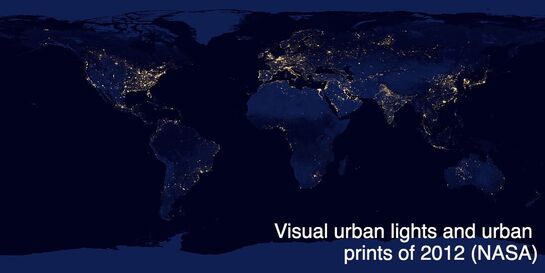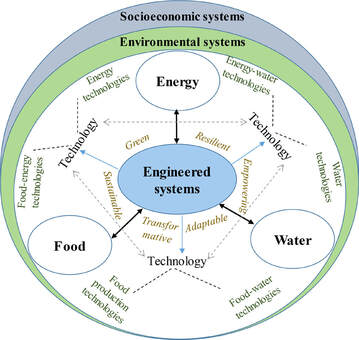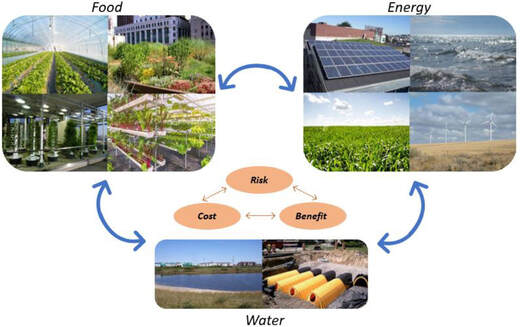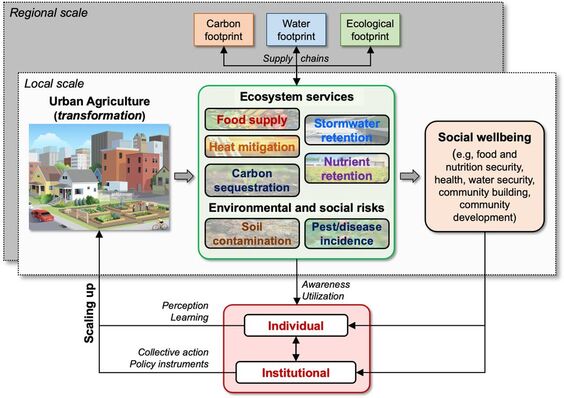"URBAN SUSTAINABILITY"

We have entered the urban century. Understanding how to build and maintain resilient, sustainable, and socially just urban systems is one of the grand societal challenges of the 21st century. At present, more than half of the world’s population lives in urban areas that drive global resource use and emissions, and predominately rely on external supplies of ecosystem services. It is projected that 2.5 billion more people will live on the planet by the mid-21st century, with disproportionate growth in urban populations. Hence, how we can mitigate the impacts of urbanization on ecosystem services and wellbeing of urban residents is a pressing research question and contributes substantially to the global sustainability agenda. In this research, we adopt an integrated social-ecological perspective, and combine approaches including remote-sensed data, landscape analysis, empirical measurements, computational modeling and social sciences to address questions like: what is the role of spatial heterogeneity in affecting urban biotic communities and sustaining urban ecosystem services, how can we design and manage urban landscapes to enhance the resilience of urban food-water-energy nexus to global changes, what are the likely future trajectories of urban development, and what are the eco-evolutionary consequences of urbanization. Besides, we will conduct comparative studies in fast-growing cities in continents such as Asian and North America.
(1) Urban Food-Water-Energy Nexus
Through a recently project funded by the National Science Foundation (NSF), we have developed a multi-scalar modeling framework to address the role of synergistic technology integration with human interventions and natural solutions (e.g., urban agriculture, green energy, green infrastructure, and low-impact-development) to enhance social-ecological resilience through decentralizing urban food-energy-water (FEW) nexus. This research reveals effects of population growth, land-use transition, climate variability, and shifting norms on ES within the urban FWE nexus to elucidate the consequent water, carbon, and ecological footprints, leading to >10 peer-reviewed publications.
(2) Urban Agriculture to Advance Urban Resilience
Scaling up urban agriculture has potential to be a key lever for transformative change through decentralizing urban food supplies, fostering food systems resilience, and bolstering ecosystem services. Yet drivers of scaling up UA and its social-ecological effects across scales (i.e., within and across urban boundaries) remain elusive. Through a transdisciplinary research, we aim to investigate how scaling up urban agriculture could enhance urban ecosystem services and mitigate transboundary environmental footprints (e.g., water, carbon, and ecological footprints). Within this research, we are developing an integrated multi-agent model system to assess social, economic, and environmental impacts from scaling up urban agriculture; identify tipping points driven by individuals and institutions that foster large-scale adoption of urban agriculture; and determine optimal scenarios of urban agriculture for improving food security and urban resilience to climatic and economic changes.
FIGURE 3. Conceptual diagram of urban agriculture in the integrated urban social-environmental systems.
Sample Publications
- Wang, H., Lopez-Pujol, J., Meyerson, L.A., Qiu, J., Wang, X., Ouyang, Z. 2011. Biological invasions in rapidly urbanizing areas: A case study of Beijing, China. Biodiversity and Conservation 20 (11): 2483-2509. (pdf)
- Wang, H., Qiu, J., Breuste, J., Friedman, C.R., Zhou, W., Wang, X. 2013. Variations of urban greenness across urban structural units in Beijing, China. Urban Forestry & Urban Greening 12 (4): 554-561. (pdf)
- Wang, H., Qureshi, S., Qureshi, B., Qiu, J., Friedman, C.R., Breuste, J., Wang, X. 2016. A multivariate analysis integrating ecological, socioeconomic and physical indicators to investigate urban forest cover and plant diversity in Beijing, China. Ecological Indicators 60: 921-929. (pdf)
- Chang, N.B., Hossain, U., Valencia, A., Qiu, J., Kapucu, N. 2020. "The role of food-energy-water nexus analyses in urban growth models for urban sustainability: A review of synergistic framework." Sustainable Cities and Society 63: 102486. (pdf)
- Chang, N.B., Hossain, U., Valencia, A., Qiu, J., Zheng, Q., Gu, L., Chen, M., Lu, J., Pires, A., Kaandorp, C., Abraham, E., ten Veldhuis, M., van de Giesen, N., Molle, B., Tomas, S., Ait-Mouheb, N., Dotta, D., Declercq, R., Perrin, M., Conradi, L., Molle, G. 2021. "Integrative technology hubs for urban food-energy-water nexuses and cost-benefit-risk tradeoffs (I): Global trend and technology metrics." Critical Reviews in Environmental Science and Technology 51(13): 1397-1442. (pdf)
- Chang, N.B., Hossain, U., Valencia, A., Qiu, J., Zheng, Q., Gu, L., Chen, M., Lu, J., Pires, A., Kaandorp, C., Abraham, E., ten Veldhuis, M., van de Giesen, N., Molle, B., Tomas, S., Ait-Mouheb, N., Dotta, D., Declercq, R., Perrin, M., Conradi, L., Molle, G. 2021. "Integrative technology hubs for urban food-energy-water nexuses and cost-benefit-risk tradeoffs (II): Design strategies for urban sustainability." Critical Reviews in Environmental Science and Technology 51(14): 1533-1583. (pdf)
- Valencia, A., Qiu, J., Chang, N.B. 2022. "Integrating sustainability indicators and governance structures via clustering analysis and multicriteria decision making for an urban agriculture network." Ecological Indicators 142: 109237. (pdf)
- Qiu, J., Yu, D., Wu, J. 2022. Unravelling Linkages between Food-Water-Energy Nexus and Ecosystem Services for Achieving Urban Sustainability. In: Brouwer, F. (Eds). Handbook on the Water-Energy-Food Nexus. Edward Elgar Publishing, United Kingdom.





